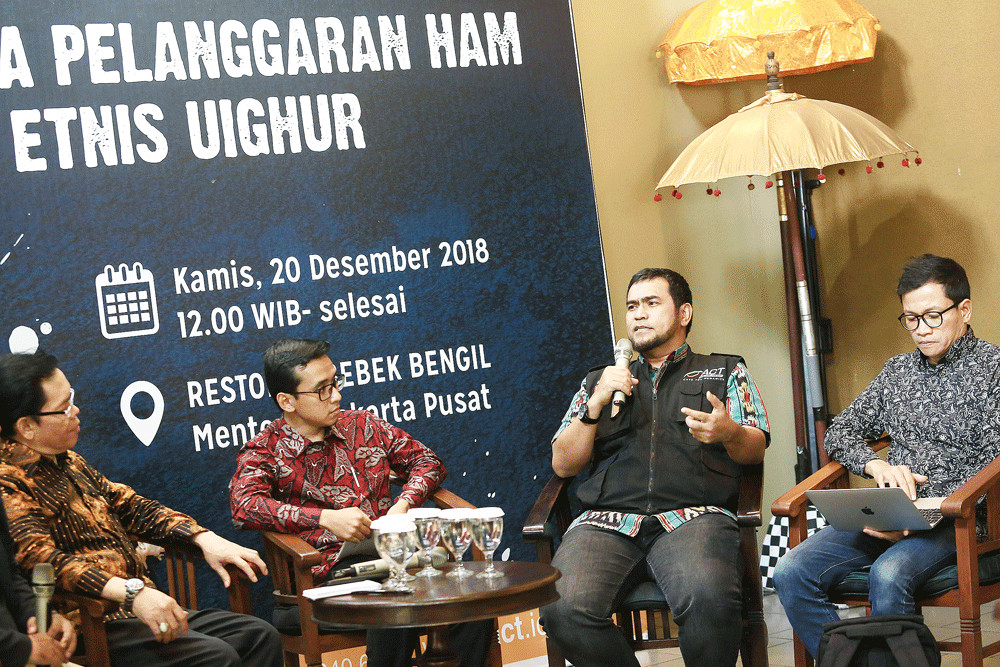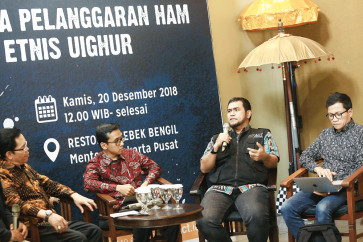Popular Reads
Top Results
Can't find what you're looking for?
View all search resultsPopular Reads
Top Results
Can't find what you're looking for?
View all search resultsIndonesia's silence on Uighur debate 'complicated': IPAC report
A new report from the Insitute for Policy Analysis of Conflict unravels the complexity of the Uighur minority debate in Indonesia.
Change text size
Gift Premium Articles
to Anyone
 Telling the truth: Aksi Cepat Tanggap (ACT) Foundation senior vice president Syuhelmaidi Syukur (second right) speaks during a discussion titled “Revealing Facts on Human Rights Violations Against Ethnic Uighurs” in Jakarta on Thursday. Also present as speakers were Indonesian Ulema Council deputy secretary-general Amirsyah Tambunan (left), international relations expert Agung Nurwijoyo (second left) and Amnesty International Indonesia executive director Usman Hamid. (The Jakarta Post/Dhoni Setiawan )
Telling the truth: Aksi Cepat Tanggap (ACT) Foundation senior vice president Syuhelmaidi Syukur (second right) speaks during a discussion titled “Revealing Facts on Human Rights Violations Against Ethnic Uighurs” in Jakarta on Thursday. Also present as speakers were Indonesian Ulema Council deputy secretary-general Amirsyah Tambunan (left), international relations expert Agung Nurwijoyo (second left) and Amnesty International Indonesia executive director Usman Hamid. (The Jakarta Post/Dhoni Setiawan )
I
n vying for a seat on the United Nations Human Rights Council next year, Indonesia may face pressure to more directly address allegations of abuse against the Uighur Muslim minority in China after much silence on the government’s part, a research note suggests.
The Xinjiang autonomous region and its resident Uighur population have been in the spotlight over the past year following reports by rights groups detailing China’s abuse of at least 1 million people from the ethnic minority. They have reportedly been forced to undergo psychological indoctrination programs in camps that Beijing has labeled as “re-education centers”. At a UNHRC meeting last year, Beijing dismissed the allegations as baseless criticism.
As the world’s largest Muslim-majority country, Indonesia’s support for oppressed Muslim minorities -- such as Palestinians and the Rohingya in Myanmar -- carries significant weight. But for the Uighurs in China, Indonesia’s silence speaks louder than words, albeit not for the reasons that most critics hold against it.
The Jakarta-based Institute for Policy Analysis of Conflict (IPAC) released a report on Friday suggesting Indonesia’s silence was motivated by issues “much more complicated” than an economic dependence on China, a common perception that many Western analysts and activists hold against Muslim countries that fail to act on the issue.
The report details the political dimensions of the Xinjiang issue in Indonesia, from the minor role of some Uighurs in Indonesian extremist networks, to 2019 electoral politics and the unproductive discussion of separatist movements for the Indonesian government.
“For the Foreign Ministry, reluctance to speak out is partly because there are perceived to be more important issues at stake with China, such as the South China Sea, and partly because it is seen more as a domestic separatist question than a human rights concern,” IPAC said in its report.
There was also “great wariness” about the government getting involved in an issue that had become politicized by President Joko “Jokowi” Widodo’s opposition to the point that a smear campaign was launched to paint the incumbent leader as a “pro-China lackey”, IPAC said. The think tank quoted an official as saying Jakarta “did not want to engage in [the Uighur persecution] narrative because it would only empower Islamists and radicals in the opposition”.

















